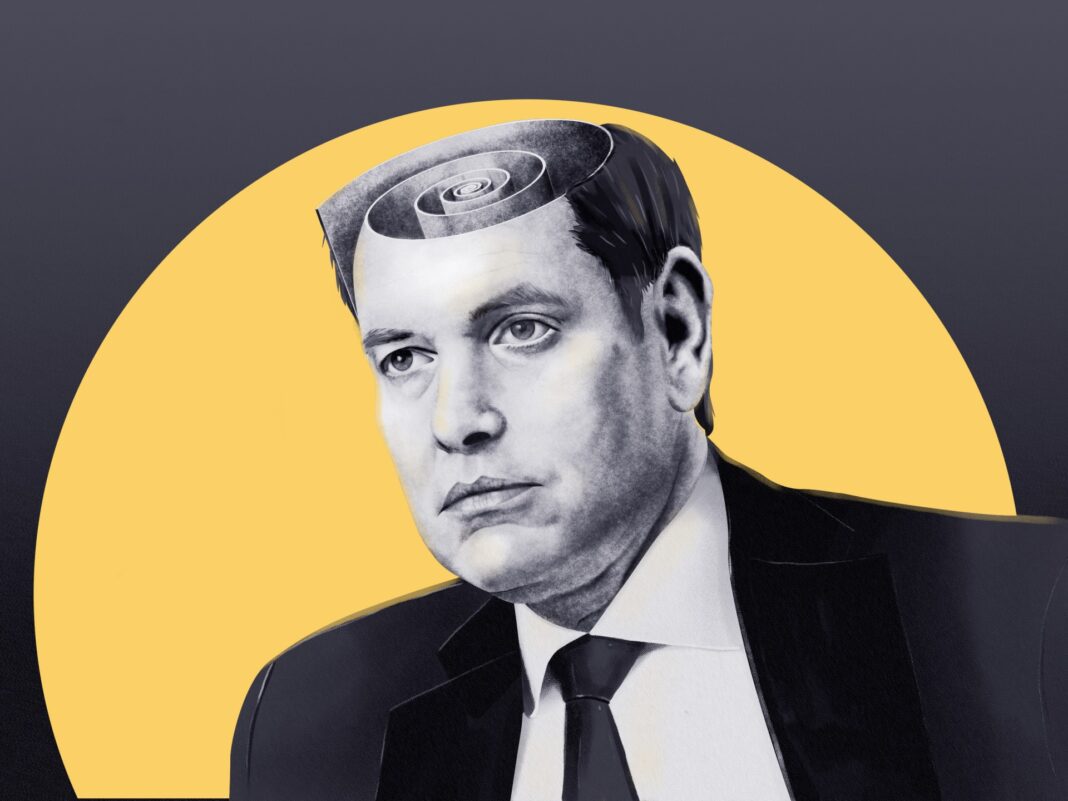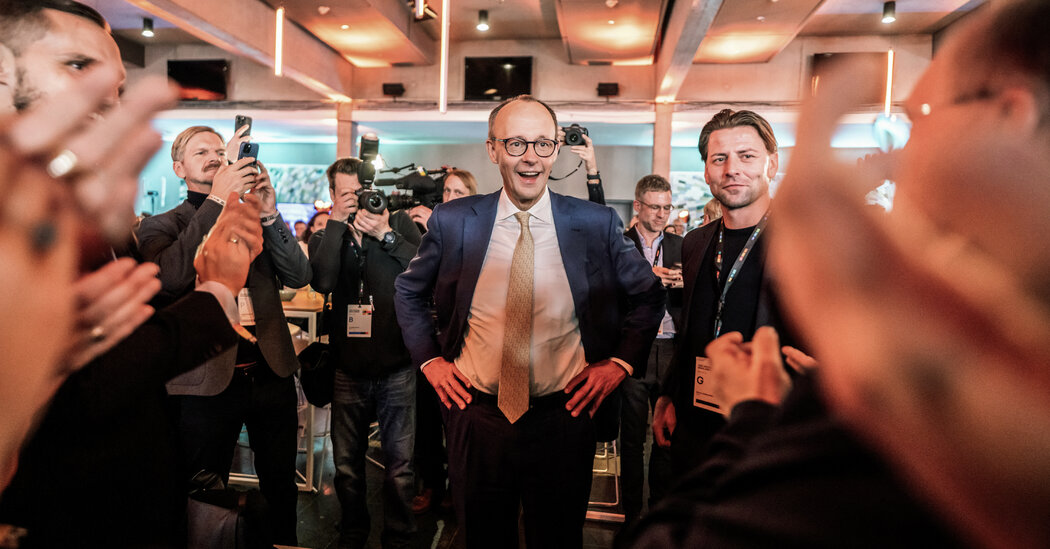When Marco Rubio first launched his presidential campaign in 2015, the then-senator championed a tough stance on Russia and decried previous efforts by United States officials to reset and bolster ties with Moscow.
Ten years later, Rubio – now America’s top diplomat – sat across from his Russian counterpart Sergey Lavrov in Saudi Arabia this week in a bid to revive relations between Washington and Moscow.
A foreign policy hawk who once called Russian President Vladimir Putin a “thug”, Rubio is now overseeing seismic shifts in the US approach to the world under President Donald Trump.
Rubio is seen as a conventional politician, with traditional conservative views. He is now serving in an administration whose public face is a tech billionaire with no previous political experience who is looking to radically hollow out federal agencies.
The new secretary of state, meanwhile, finds himself pushing Trump’s unconventional international agenda: opening up to Russia, taking over the Panama Canal, acquiring Greenland, and “owning” Gaza.
As the former senator spearheads Trump’s foreign policy, who is the top US diplomat and what drives him?
Global stage, ambition
Analysts say Rubio is motivated by a conviction that the US should play the leading role on the world stage as well as personal ambitions that saw him seek the presidency in the 2016 elections and rise through the ranks of the Republican Party.
“He has a very traditional, hawkish view of America’s role in the world, but we’ve also seen ways in which he’s simply dispensed with long-held views since becoming secretary of state,” said Michael Hanna, US programme director at the International Crisis Group think tank.
Approving the gutting of international aid programmes and the US Agency for International Development (USAID) is one glaring example of Rubio’s own shifts.
Rubio has long been an advocate of aid programmes, promoting them as a facet of American soft power in the world.
But Rubio, like other Republicans named to key positions in the Trump administration, has fallen in lockstep with the president, embracing his “America First” policy.
Hanna suggested that Rubio, 53, may ultimately have his eyes on the White House after Trump leaves office.
“I think it’s ambition. Being a high-profile senator is one thing, and being the secretary of state is another in terms of your profile, particularly on a global stage,” he told Al Jazeera.

‘The trauma of exile’
The son of Cuban immigrants, Rubio comes from humble beginnings. His father was a bartender, his mother a cashier and hotel cleaner.
Although his parents moved to the US before Fidel Castro’s revolution in the 1950s, he grew up in Miami’s Cuban community alongside exiles who fled the communist government.
The staunchly anti-Castro constituency has been veering to the right of the US political spectrum over the decades, helping turn Florida into a Republican stronghold.
In his 2012 memoir, An American Son, Rubio suggests that he acquired his early political orientation and sense of patriotism from the Cuban immigrants he grew up around.
“I knew how the trauma of exile – disbelief, guilt, a sense of loss – had shaped their lives and my own,” he wrote.
“I knew that their love, born of gratitude for the country that had welcomed them and encouraged their aspirations, and the loss that had brought them here, had made them vigilant in their watch for anything that they thought could threaten America … This is the culture that shaped my youth.”
Author Manuel Roig-Franzia writes in his 2012 book, The Rise of Marco Rubio, that his family’s roots and growing up in Miami’s Cuban community shaped “his political identity”.
Throughout his career, Rubio has advocated adversarial policies, including strong sanctions, towards left-wing Latin American leaders who he views as autocrats or hostile to the US.
During the administration of US President Barack Obama, Rubio was a vocal opponent of the detente with Cuba.
Rubio has also been a supporter of more hardline policies against the government of Venezuelan President Nicolas Maduro.
In 2019, he appeared to issue a blunt “regime change” threat to Maduro.
Amid a spike of tensions between the US and Venezuela, Rubio posted a series of photos of slain and imprisoned dictators to social media after addressing the Maduro government.
One post featured a bloody image of late Libyan leader Muammar Gaddafi, who was executed by rebels in 2011.
Rubio, a first-year senator in 2011, had called for an even more forceful US intervention against Gaddafi during the Libyan uprising as US and NATO fighter jets bombarded government positions there.

Pax Americana
Stephen Zunes, an international studies professor at the University of San Francisco, said Rubio’s hawkish worldview of “might makes right” has become prominent amongst Republicans who came of age in the 1980s during the Ronald Reagan years with the collapse of the Soviet Union.
“I think he wants to see a Pax Americana,” Zunes says, referring to the concept of global peace ushered in by American dominance.
Rubio suggested as much himself in 2015, writing about his vision for US foreign policy in Foreign Affairs. “The first and most important pillar of my foreign policy will be a renewal of American strength. This is an idea based on a simple truth: the world is at its safest when America is at its strongest,” he wrote.
A presidential candidate at the time, Rubio outlined three pillars for his foreign policy: Military strength, protecting free trade and “moral clarity” in “defending freedom”.
Such language harkens back to the presidency of George W Bush in the 2000s when Rubio was in his early political career.
The Florida politician has always expressed fondness for Bush. He wrote in his memoir that the first congratulatory phone call he received after being elected to the US Senate in 2010 was from the former president.
In 2015, Rubio defended the 2003 US-led invasion of Iraq at a time when there was near consensus in Washington that it was a mistake.
“The world is a better place because Saddam Hussein is not there,” he told Fox News.

The other Bush
Rubio was just 27 when he was first elected to public office as a West Miami commissioner in 1998.
In less than 13 years, he lept from municipal politics to the US Senate. In between, he served for eight years in the Florida House of Representatives, leading the chamber between 2006 and 2008.
Throughout his meteoric rise, Rubio had a powerful ally – Florida’s then-Governor Jeb Bush.
Jeb – the brother of former President George W Bush and son of former President George HW Bush – saw Rubio as a talented young politician.
When Rubio became State House speaker, Jeb gifted him a golden sword that he held up in front of his fellow lawmakers with a broad smile. Jeb proverbially anointed Rubio as a “conservative warrior”.
Accounts vary on whether the two were close friends or mere allies, but publicly, they have expressed admiration for one another over the years. And Bush saw something in Rubio early on; he contributed to his first local election campaign.
But it wasn’t just Bush. Florida politicians who interacted with Rubio when he was starting to forge his way in politics say it was apparent that he was going places.
Congressman Carlos Jimenez told NPR last month that the first time he heard Rubio speak early in his career, he knew that he “has it” – referring to something special.
“Marco Rubio not only exemplifies the American dream. I would tell you that he exemplifies the Republican Party,” Congressman Mario Diaz-Balart added.

2016 presidential run
From the moment he burst onto the national stage, Rubio – a young, eloquent, combative politician with a compelling personal story from a growing demographic base – seemed to tick all the boxes for a rising star in the Republican Party.
Rubio made it to the Senate with such fanfare that less than two years after his election, the campaign of Republican presidential nominee Mitt Romney considered him for the vice presidential spot in 2012.
When 2016 came around, Rubio threw his own hat into a crowded ring of Republican candidates seeking the presidency.
His interactions with two rivals – his ally, Bush, and his future boss, Trump – stood out.
Rubio put past political ties aside when he tried to occupy the establishment lane in the primary that was seen as reserved for Bush.
The two exchanged attacks on the debate stage and campaign trail, but Rubio’s blows came off as more efficient, showing his willingness to dispense with old allies to get ahead.
“I thank God every day that George W Bush was president, but Jeb has no foreign policy experience,” Rubio said in February 2016.
Bush’s campaign was already struggling on multiple fronts, and Rubio may have helped finish it off.
The Floridian also came after Trump at a time when other candidates were avoiding confrontations with the sharp-tongued businessman.
Rubio called out the now-president for lack of foreign policy experience as well. He described him as a “con artist” and mocked his “small hands”.
The real estate mogul already had Rubio, at one point his closest rival in the primaries, in his crosshairs.
He branded him “Little Marco Rubio” and ridiculed him at every turn, charging that the then-senator wore too much makeup, drank water excessively and sweated a lot – amongst other insults.
Despite the personal nature of the rivalry, Rubio endorsed Trump when he became the nominee and backed him again early in the 2024 campaign season despite his legal troubles.
By endorsing Trump, Rubio appeared to acknowledge the president’s Republican takeover and chose to work within the party system.
The contrast between his approach to Bush and Trump shows Rubio’s pragmatic side, being willing to attack old allies and work with previous foes.
Asked this week after the talks with Russian diplomats whether he thinks Moscow wants peace, Rubio suggested that the world is more complex than the premise of the question.
“I don’t view diplomacy that way. I think diplomacy ultimately is based on actions. It’s based on commitments that are kept,” he said.

Pro-Israel advocacy
While Rubio suggested that the path forward for US policy on Russia and its invasion of Ukraine is complex, days earlier, he painted a black-and-white image of the Middle East conflict.
While meeting with Israeli Prime Minister Benjamin Netanyahu, Rubio heaped praise on Israel, calling it a “free enterprise democracy”.
“If there were more Israels in the Middle East, more countries like that, the world would be a safer and a better place,” he said.
Conversely, the top US diplomat called Iran the “single greatest source of instability in the region”.
He also praised Trump’s proposal to ethnically cleanse Gaza as “bold”.
Zunes, the professor, said Rubio has “extreme” views on Israel-Palestine and other areas of the world, but he was still seen as a reasonable pick in the Trump administration. The Senate confirmed Rubio in a 99-0 vote in January.
“If any other person was president, [Rubio] would be considered pretty extreme. It’s just that in comparison to some of these other appointees, he is seen as fairly reasonable,” Zunes said.
Rubio has a long history of pro-Israel advocacy. He has introduced measures to penalise companies that boycott Israel over its mistreatment of Palestinians and rebuked Latin American leaders critical of the US ally as “pro-Hamas”.
Revering and centring Israel has become a nearly unquestionable tenet in the modern Republican Party.
Conservatives have long seen Israel as an extension of US power in the Middle East, especially during the Cold War when the Soviet Union sided with Arab governments in the conflict.
The rise of evangelicals – who back Israel for theological reasons – as a major Republican constituency cemented right-wing support for Israel over the past decades.

Changing views
While Rubio may share Trump’s views on Israel-Palestine, his history of advocacy for internationalism, foreign aid and a leading US global role may not bode well with what Trump seems to want to achieve – a nationalistic withdrawal from the world stage and unilateral pursuit of perceived US interests.
Still, the secretary of state appears to have been revising his views.
Rubio was once a stalwart advocate of aid to Ukraine, but last year – as scepticism around the US role in the war grew in right-wing circles – he proclaimed that “the United States is funding a stalemate in Ukraine”.
Recently, he even spoke of an inevitable “multipolar world” – which appears to contradict his previous statements about the need for the US to be the supreme global power.
It remains unclear whether Rubio is in the midst of an ideological transformation or just doing what the job requires.
As secretary of state, Rubio must channel Trump. He doesn’t set foreign policy; he conducts it on behalf of the president.
Zunes said Rubio knew coming into the job that he had to advocate for positions he does not believe in.
“I think he felt that he could have at least some influence in that position, that he could convince the president on a few things, could steer the policy in a direction that he thought would be better,” he said.


